Indian Americans in inter-faith marriages tell Sandip Roy how they celebrate the festival.
"It's our Christmas," is how many Indian immigrants explained Diwali to American co-workers and neighbours. But as more and more Indian immigrants and their children enter mixed-faith marriages, they already have a Christmas on the family holiday schedule.
These are, as one Brooklyn group calls it, the "mixed masala" families. Some of these families share their stories about how they keep traditions from both faiths alive and meaningful. Diwali becomes the kick-off to the holiday season of Thanksgiving, Christmas and Hanukkah.
'My husband, a devout Catholic, is open to all festivals'
I grew up in Calcutta (now Kolkata) and remember participating in the Kali Puja. Then we moved to New York City and then to Houston. But we always celebrated Diwali. My mother had over 100 clay diyas and we would place them around our house. We still do that. In fact, my children say one of their favorite parts about Diwali is putting diyas around the house and around the pool.
We now have an annual Diwali party at our house. Anywhere between 20 to 100 people show up. We have dinner and fireworks. Of course, the fireworks are illegal, but we just do it in the backyard and the children love the sparklers. The older children give one to two-minute talks about what Diwali means, the triumph of good over evil.
We've been doing this every year since we got married. My husband Richard is a devout Catholic from a 100 percent Italian family, the epitome of a good Catholic boy. He was even an altar boy at church. But in school they celebrated other cultures and he has been very open to it. We celebrate Easter and Christmas, and we invite ourselves over to a friend's house for Hanukkah.
We are doing this for the children -- to teach them about their heritage. More and more people from different backgrounds are getting married these days. Children need to know who they are. It does not mean they need to grow up Catholic or Hindu. They can choose. Though I have to say, for whatever reason, the mother often leads the way when it comes to inculcating culture. But I try to do both. I definitely think much more about my heritage because of my children. I think I have become more Hindu today than I was 10 to 15 years ago.
Amanda Vavilala lives in Houston with her husband Richard Morales and their three children, two boys and a girl. They have been married since 2000.
'Stephen loves the way we celebrate Diwali'
I am the only daughter of Andhra Hindu parents. I grew up partly in London, partly in Madras. In Madras, I remember visiting family and friends who made bommala koluvus -- elaborate displays of dolls on steps covered with a white cloth. I remember a gorgeous display of the Ramayana where the family members had made the dolls out of coconut shells. London Diwalis involved gathering with close family friends, feasting and lighting fireworks and sparklers in the garden.
Stephen and I have been married for almost six years, and he was not familiar with Diwali before we met. He is astounded that given my serious misgivings about Rama's hero status because of how badly Sita is treated, I still celebrate Diwali with joy. But he loves the way we discuss the complexities with the kids, and relate the stories to our lives and present day society.
Our kitchen has a mandir with a picture of Venkateswara, just like every kitchen of my childhood. On Diwali, we gather before it, light an agarbatti and say the prayers we know. My mother has taught the boys two prayers: Shuklam Bharatharam Vishnum and Vina Venkatesam. I have taught the boys the Gayatri Mantra. I go to my son Satya's preschool classroom, tell the Ramayana story, light diyas and give out sweets. In the evening, we go to the Hindu Temple in Flushing, and have dosas in the canteen downstairs. Another family tradition is complaining about how much styrofoam is used in the temple canteen.
Sunita Vishwanath, founder, Women for Afghan Women, lives in Brooklyn with her three sons and husband Stephen Shaw, who runs the Unemployed Philosopher's Guild.
Are you in an inter-faith relationship? How do you celebrate Diwali with your partner? Write in to getahead@rediff.co.in (subject line: 'Inter-faith Diwali') with your experiences and a photograph if possible. We'll publish the best entries right here.
'We miss India's festive Diwalis'
Image: Uday and Jerina KapoorWe celebrate Diwali every year with a Lakshmi Puja, singing Om Jai Jagdish Hare, at our home. We light some lamps in our house and distribute sweets to our Indian neighbours and attend Diwali parties at our friends' homes over the weekend. The celebrations here are private and unlike India, we miss the festive milieu in which the entire community can be seen celebrating.
We call up our relatives both here and in India. In India, when we call, we can hear the firecrackers in the background. In the US, we have to make a deliberate effort to feel and enjoy the festival, while in India it's in the atmosphere.
Adds Uday, "Last year, I attended Diwali in India after many years and the festive milieu engulfed me; I realised what I had missed all these years. The whole country celebrates and you cannot help but be a part of the celebrations. Unlike here in the US, where we are not permitted to light fire crackers on our private property, the fire crackers are a big part of the festivities there."
Uday and Jerina Kapoor have been married for two decades and live in San Jose. She is a Parsi from Mumbai and he is a Hindu Punjabi from New Delhi. He works for Oracle and she owns a paediatric practice.
Bringing Indian-American families together
Growing up, Diwali was the most joyous time of the year. My favorite memories are of fireworks, eating endless sweets and family. The must-have was, of course, fireworks. Before I met Ken almost 10 years ago, I used to throw a Diwali party at my house in San Jose most years, for about 100 people.
The first Diwali we celebrated together, Ken asked, 'What is Diwali? Is it legal to use fireworks in the city? Aren't all those oil lamps a fire hazard?'
This year, Ken and I will be hosting a Diwali party for all the Indian-American families at our children's school, about 20 families. And he will be the co-host, joining in lighting the oil-lamps and the fireworks and being a non-complaining smiling spouse throughout the night.
I am a Sikh, so I will teach the kids about why we celebrate Diwali. There is the well-known Hindu story of Rama's return from the forest. But there is also the Sikh story of the freedom of our sixth Guru, Guru Hargobind, from Emperor Jehangir's jail in Gwalior.
Inder Preet Singh Dhillon is a dermatologist and lives in San Francisco with her spouse Ken Perry McNeely, an executive with AT&T and their two children.
Starting a Mixed Masala group to bring Diwali home
Image: A Mixed Masala Diwali partyI came to Brooklyn at the age of four. My dad would put up lights for Diwali. Our Italian and Jewish neighbours would ask why we were putting up Christmas lights in October! We had three families of Marathi background near us. So, the moms would get together and make laddoo, chewda and chakli. You could tell the adults were very nostalgic about Diwali.
Now we have a get together with my cousins, also in mixed marriages, neighbours and friends. We light sparklers on our roof, explain the history of Diwali to the kids and I do a small Lakshmi Puja in our home.
But we also have a Mixed Masala group Diwali party. I was in a period in my life where I noticed my children were not getting adequately exposed to Indian culture. I wanted to meet other folks, particularly in mixed marriages, that I saw around the neighbourhood, who I thought might be feeling the same. My husband, who immigrated from Ireland in his mid-20s, said, "Why don't you post to Park Slope Parents (a bulletin board in Brooklyn)?" Now it's become a group called Mixed Masala -- families connected to South Asian culture because of spouses or adopted children. The group started in April 2007. It has provided a sense of grounding for my kids by meeting other mixed kids, some wonderful and hopefully lifetime friends for me, and drinking buddies who can share stories about being married to an Indian for my husband! We hold three flagship events -- Diwali, Annual Picnic and Belated Holi.
For Diwali we hold an annual dress-up event at a mid-town restaurant. We dress up, exchange gifts for kids, have Bharata Natyam dance and a singing performance, and sort of close the 'Indian' year off...before our other holidays -- Thanksgiving, Hanukkah, Christmas and New Year's. We are very much a social family so any excuse to party and honour a holiday -- we're all for it.
Asha Bhide Cryan was born in Sangli, Maharashtra, but grew up in the US. She works for JP Morgan Asset Management and is trying to learn the tabla. She lives with her husband Dermot and two children in Brooklyn, New York.
Ignorance about Diwali doesn't stop the festivities
Being a Bengali, we really celebrated Durga Puja. Living in America, Durga Puja celebrations were conducted with the loose family-friends' group my parents cultivated, a pseudo-set of extended family. Diwali was often celebrated in a casual way for us at home. Candles and sandlewood paste, a bit of a prayer and a nice dinner.
My husband was born and raised in the Chicago suburbs in a Jain family. He describes two phases of Diwali: The religious aspect -- a celebration of when Mahavir attained nirvana; and a coincidence between Jain beliefs and the Gujarati celebrations of Navratri, which include garbas and occasionally, illegal fireworks.
The first time my husband and I really celebrated Diwali together was two years ago. We gathered with his extended family at the rented 'clubhouse' of a condo association. There was catered food, a karaoke machine and dandiya sticks for dancing. My parents came. The religious significance of Diwali was downplayed perhaps because the religious observances are often conducted at the temple, where an air of asceticism and reflection accompany any major event.
My favourite part of Diwali here is the over-the-top festiveness. I chide myself for my ignorance of the stories that accompany Diwali, knowing that I won't take steps to change this gap in my heritage knowledge until it comes time for me to teach it to the children I haven't had yet. Now it's been mythologised in pop culture by The Office, and it's being recognized by the White House.
Mimosa Roy works with non-profits and grassroots organizations and lives in Chicago with her husband Mehul Shah, a financial analyst. They got married in 2006.
'Our own strange American Diwali'
Image: Mixed Masala allows children of inter-faith marriages a chance to mix with other such childrenPhotographs: Courtesy Mixed Masala
I know Shay celebrated by dressing up and going from home to home of his parents' friends while doing the traditional touching feet, money, sweets exchange. The first time we celebrated was while visiting his parents in England. I, as the non-Indian who grew up Christian in Chicago, insisted that we visit his parents for Diwali. I knew (or suspected) that it was very important to them to share the holiday with their son and his new(ish) wife. While it was extremely boring for us, his parents were very pleased to take us around.
Here, we make Diwali our own, a strange, mixed American version. We make it up every year with our focus being fun for the children. We take them outside and draw rangolis on the front stoop (with coloured chalk). We read books to our kids about Diwali and have a read-along CD as well. We have asked the Indian side of the family to send their gifts at Diwali rather than Christmas. We want the Indian holidays to be fun for them.
The New York Marathon happens to be the weekend after Diwali this year and goes by our front door. So, we are aiming to dress the kids up, have a pot luck, let them get down to some South Asian tunes and watch the runners!
Courtney Vishawadia, a policewoman with the New York Police Department, lives with her husband Shailesh, who works in the music industry, and their two toddlers in Brooklyn. They have been married since 2000.
'My Danish husband and kids look forward to Diwali'
When Asha reached out to start a group, later called Mixed Masala, I was excited to meet other Indian families that represented the mix in our Mixed Masala. Growing up as one of the only Asians in a very homogeneous town, our family celebrated a number of Indian holidays -- the most important being Diwali. Usually, I was a bit reserved about sharing my culture, because many people in my town didn't appreciate the diversity that we represent, but Diwali made me proud.
In keeping with my family's Diwali traditions, I suggested we celebrate the festival with our new Mixed Masala family, and organized a party in midtown Manhattan, something upscale and special -- a time to celebrate our culture and tradition. This year, we will have a Bharata Natyam dancer and a tabla player available to educate and entertain us. My husband, who is from Denmark, and our kids love Mixed Masala and really look forward to Diwali.
Simmi Malhotra Dagnemark's parents were immigrants from Punjab. She lives in Brooklyn with her husband Morten, a Danish immigrant, and their two children.
'My Jewish-Christian husband and in-laws sit for the Diwali puja'
Image: Charu Agarwal Dewitt and Aaron DewittGrowing up, we always did a puja at home and celebrated with a party with family and friends. My brother and I also got new clothes to wear.
The first Diwali after our wedding, my husband Aaron came to my parents' home and joined in our festivities. We told him about the story of Diwali and he joined the puja too. Last Diwali, we all went to my relatives' place in Pittsburgh and Aaron's parents and sister also joined us. They all did the puja with us. We exchanged gifts and celebrated with fireworks in the driveway. Aaron has learned that Diwali traditions are similar to Jewish and Christian traditions. He has learned the story behind it and learned that it is a lot of fun.
This year, we are going to Pittsburgh again to celebrate with my family; it has become a tradition to go there. The fireworks are a must-have. No matter how cold it is, we always celebrate with sparklers and even some that fly up in the air. My husband participates in everything and enjoys it all. His mother is Jewish and his father is Christian, so he grew up celebrating holidays from different faiths. Our marriage has just added to the mix.
Charu Agarwal Dewitt and Aaron Dewitt from Ann Arbor, Michigan, have been married since 2008. He is doing a pediatric cardiology fellowship and she is a science researcher at a bio-tech company.
'Our first year of celebrating Diwali as a family'
I used to live in New York with my family, but after meeting my husband Pete (as we call him) in the air my life changed. I moved to Tampa, Florida, and became a wife and stepmother. Pete and I had two wedding celebrations, one in the Christian faith and one in the Hindu faith.
I think by marrying a man who isn't from the same culture, religion, or background as mine I could say I took a huge risk in losing everything that was instilled in me as a child. I am blessed to have three men in my life who I love very much and who respect my religion and culture and make it a part of theirs. My boys love Indian clothes, eat Indian food (with their hands), love bhangra music and are even learning to speak Bengali. My boys have even opted to call me 'Ma.'
I have assimilated to the Christian lifestyle as well. My husband and I are religious churchgoers. Even when my husband is out of town, I make it a point to attend church every Sunday with the boys to learn about the Christian faith. After church, as a family, we go to the mandir and learn about Hindu gods. We do the aarti and have prasad.
For Diwali, when growing up, we would go to the South Street Seaport and watch the fireworks, the shows, buy Indian food at the stalls. My Indian friends and I started a dance group and we would go out and perform for all the Indian events in New York.
This is our first year celebrating Diwali as a family, being away from my relatives and friends in New York. We will be celebrating Diwali here in Tampa with a few of our friends who are also in interfaith marriages.
Henna Basu Petersen is an executive recruiter living in Florida with her husband Karl Petersen, a Captain for Jet Blue Airways, and their sons Sam and Mitch.
Inputs by Shalini Kathuria Narang

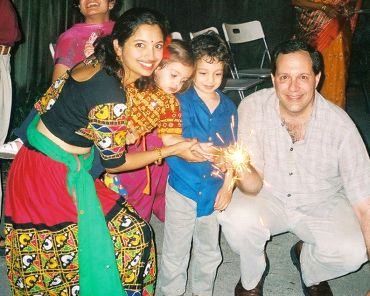
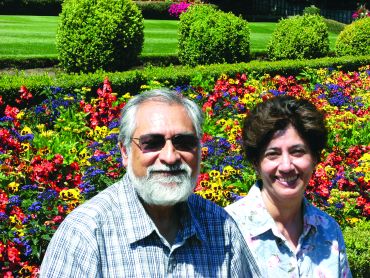
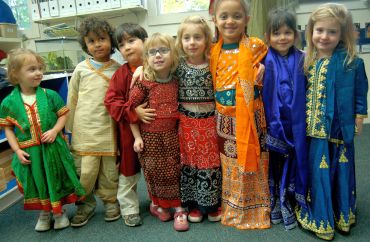
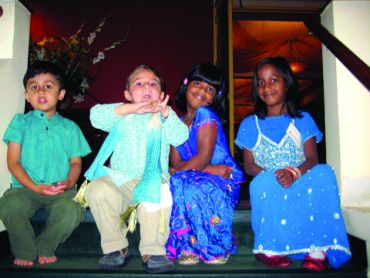
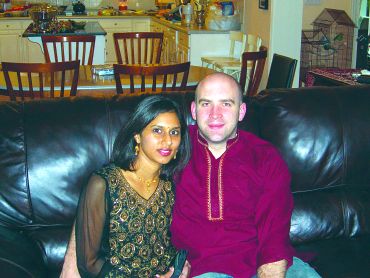
Comment
article